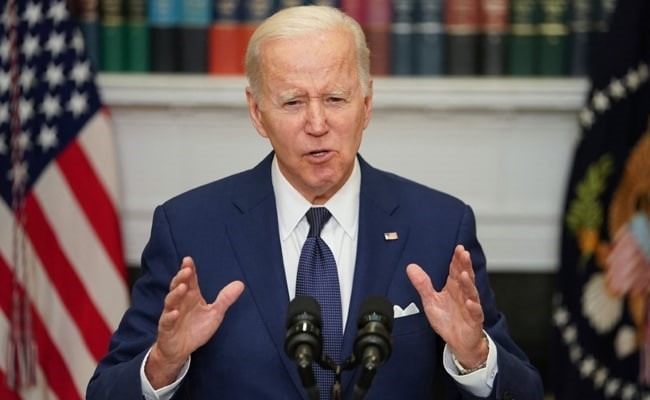| Translate This News In |
|---|
According to four people familiar with the situation, the Biden administration is considering removing the restriction on US sales of offensive weapons to Saudi Arabia, but any final decision is anticipated to be contingent on Riyadh making progress toward ending the war in neighbouring Yemen.
Senior Saudi officials pressured their US counterparts in recent months to abandon a policy of providing exclusively defensive armaments to the kingdom’s largest Gulf partner, according to three sources ahead of President Joe Biden’s visit this week.
Internal US considerations are informal and at an early level, with no decision imminent, according to two sources, and a US official told Reuters there were no negotiations on offensive weaponry with the Saudis “at this moment.”
As Biden prepares for a diplomatically hazardous trip, he has indicated that he wants to repair damaged relations with Saudi Arabia at a time when he wants expanded Gulf oil supplies as well as deeper Arab security ties with Israel to confront Iran.
Any effort to lift prohibitions on offensive weaponry will undoubtedly face opposition in Congress, especially from Biden’s fellow Democrats and opposition Republicans who have been loud critics of Saudi Arabia, congressional aides say.
Soon after taking office in early 2018, Biden took a tougher stance on Saudi Arabia’s campaign in Yemen against the Iran-aligned Houthis, which has resulted in heavy civilian casualties, as well as Riyadh’s human rights record, particularly the 2018 killing of Washington Post journalist and political opponent Jamal Khashoggi.
Biden, who called Saudi Arabia a “pariah” as a presidential candidate, ordered a halt to US backing for military operations in Yemen, including “related arms sales,” in February 2021.
Saudi Arabia, the US’s largest arms customer, has chafed under the limitations, which have halted the kind of weapons deliveries that previous US administrations had delivered for decades.
Since Russia’s invasion of Ukraine in March, the US and other Western countries have urged Saudi Arabia, the world’s top oil exporter, to pump more oil to compensate for the loss of Russian supply.
Saudi Arabia also received accolades from the White House for agreeing in early June to a two-month extension of a UN-brokered truce in Yemen, the site of the world’s greatest humanitarian disaster.
Washington now wants it to be a permanent cease-fire.
According to a person familiar with the situation in Washington, the administration has began internal discussions regarding the prospect of lifting Saudi arms limits, but has not reached a decision-making stage.
According to a second source, Saudi authorities raised the issue during Deputy Minister of Defense Khalid bin Salman’s visit to Washington in May.
The Saudi authorities did not respond to a request for comment.
However, the sources cautioned that no announcement would be made during Biden’s July 13-16 trip, which will include stops in Israel and the West Bank.
Any decision, they warned, will be greatly influenced by whether Riyadh is seen to have done enough to find a diplomatic solution to the Yemen conflict.
Among the most expensive goods the Saudis are expected to pursue are precision-guided munitions (PGM), such as those approved by former President Donald Trump despite opposition from members of Congress.
According to two sources, the Biden administration is anticipated to proceed with caution as it discusses which systems might be supplied. According to Amnesty International, US-made precision-guided bombs were used in a Saudi-led coalition air strike on a detention centre in Yemen in January, which killed dozens.
If Washington relaxes the restriction, it may be simpler to sell less-lethal equipment like as armoured personnel carriers or refill supplies of less-sophisticated ground-to-ground and air-to-ground missiles.
Despite existing limits, the US began increasing military support for Saudi Arabia earlier this year in response to Houthi missile attacks on the kingdom.
The Pentagon claimed in November that Washington had approved missile and anti-ballistic defence system shipments to Saudi Arabia, and that the US had also deployed Patriot missiles this year, all of which were deemed defensive by US officials.
The Biden administration has also remained committed to providing the Saudis with a Terminal High Altitude Area Defense (THAAD) system, which was first approved in 2017 to counter ballistic missile threats.
While Congress have usually agreed to such purchases, Biden may face backlash if he continues to sell offensive weaponry to Riyadh.
Some have questioned Biden’s choice to visit Saudi Arabia, seeing it as giving legitimacy to Crown Prince Mohammed bin Salman, the Saudi de facto leader whom the US intelligence community believes was behind Khashoggi’s murder.
Among the potential opponents would be Democratic Senator Chris Murphy, a vocal critic of Saudi Arabia’s operation in Yemen who commended Biden when he halted offensive arms sales.
According to an assistant, Murphy does not believe that such deliveries should be resumed at this time.


















